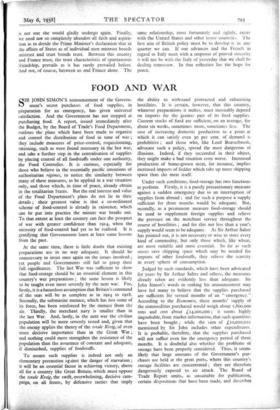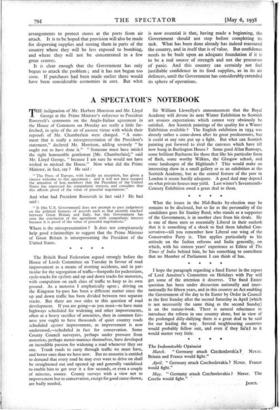FOOD AND WAR
SIR JOHN SIMON'S announcement of the Govern- ment's secret purchases of food supplies, in preparation for an emergency, has given universal satisfaction. And the Government has not stopped at purchasing food.- A report, issued immediately after the Budget, by the Board of Trade's Food Department, Outlines- the plans which have been made to organise and control the distribution of food in time of war ; they include measures of price-control, requisitioning, rationing, such as were found necessary in the last war, and take a further step in the centralisation of supplies by placing control of all foodstuffs under one authority, the Food Controller. It is curious, especially for those who believe in the essentially pacific intentions of authoritarian regimes, to notice the similarity between many of these measures, to be applied in a war situation only,. and those which, in time of peace, already obtain in the totalitarian States. But the real interest and value of the Food Department's plans do not lie in their details ; their greatest value is that a co-ordinated scheme of food-control is already in existence, which can be put- into practice the minute war breaks out. To that extent at least the country can face the prospect of war with greater confidence than 1914, when the necessity of food-control had yet to be realised. It is gratifying that Governments learn at least some lessons from the past..
At the same time, there is little doubt that existing preparations are in no way adequate. It should be unnecessary to insist once again on the issues involved ; yet people and Governments still fail to grasp their full significance. The last War was sufficient to show that food-storage should be an essential element in this country's war preparations ; the same lesson is likely to be taught even more severely by the next war. For, firstly, it is a hazardous assumption that Britain's command of the seas will be as complete as in 1914 to 1918. Secondly, the submarine menace, which has lost some of its force, -has been reinforced by the menace from the air. Thirdly, the merchant navy is smaller than in the last War. And, lastly, in the next war the civilian population will be more severely tested and, given that the enemy applies the theory of the totale Kreig, of even more decisive importance than in the Great War ; and nothing could more strengthen the resistance of the population than the assurance of constant and adequate, if diminished, supplies of foodstuffs.
To assure such supplies is indeed not only an elementary precaution against the danger of starvation ; it will be an essential factor in achieving victory, above all for a country like Great Britain, which must oppose the totak Kreig, the swift, overwhelming, decisive cam- paign, on all fronts, by defensive tactics that imply the ability to withstand piotracted and exhausting hostilities. It is certain, however, that this country, whatever preparations it makes, must inevitably depend on imports for the greater part of its food supplies. Current stocks of food are sufficient, on an average, for about six weeks, sometimes more, sometimes less. The cost of increasing domestic production to a point at which it can satisfy even 30 per cent. of demand is prohibitive ; and those who, like Lord Beaverbrook, advocate such a policy, spread the most dangerous of illusions. Indeed, if they succeeded in their object, they might make a bad situation even worse. Increased production of home-grown meat, for instance, implies increased imports of fodder which take up more shipping space than the meat itself.
Under such conditions, food-storage has two functions to perform. Firstly, it is a purely precautionary measure against a sudden emergency due to an interruption of supplies from abroad ; and for such a purpose a supply sufficient for three months would be adequate. But, secondly, as a permanent measure food-storage should be used to supplement foreign supplies and relieve the pressure on the merchant service throughout the course of hostilities ; and for this not less than a year's supply would seem to be adequate. As Sir Arthur Salter has pointed out, it is not necessary or wise to store every kind of commodity, but only those which, like wheat, are most suitable and most essential. So far as such stores save shipping space which may be needed for imports of other foodstuffs, they relieve the- scarcity in every' sphere of consumption.
Judged by such standards, which have been advocated for years by Sir Arthur Salter and others, the measures already taken are evidently less than adequate. Sir John Simon's words in making his announcement may have led many to believe that the supplies purchased are sufficient for several months of an "emergency." According to the Economist, three months' supply of the commodities purchased would weigh about 1,800,000 tons and cost about L14,000,000 ; it seems highly improbable, from market information, that such quantities have been bought ; while the sum of £10,030,033 mentioned by Sir John includes other expenditures. It is probable, therefore, that the supplies purchased will not suffice even for the emergency period of three months. It is doubtful also whether the problems of storage have been properly considered. Thus, it seems likely that large amounts of the Government's pur- chases are held at the great ports, where this country's storage facilities are concentrated ; they are therefore dangerously exposed to air attack. The Board of Trade Report omits, as unsuitable for publication, certain dispositions that have been made, and describes arrangements to protect stores at the ports from air attack. It is to be hoped that provision will also be made for dispersing supplies and storing them in parts of the country where they will be less exposed to bombing, and where they will not be concentrated in a few great centres.
It is clear enough that the Government has only begun to attack the problem ; and it has not begun too soon. If purchases had been made earlier there would have been considerable economies in cost. But what is now essential is that, having made a beginning, the Government should not stop before completing its task. What has been done already has indeed reassured the country, and in itself that is of value. But confidence needs to be built upon an adequate foundation if it is to be a real source of strength and not the precursor of panic. And this country can certainly not feel justifiable confidence in its food supplies, as in its air defences, until the Government has considerably extended its sphere of operations.



































































 Previous page
Previous page